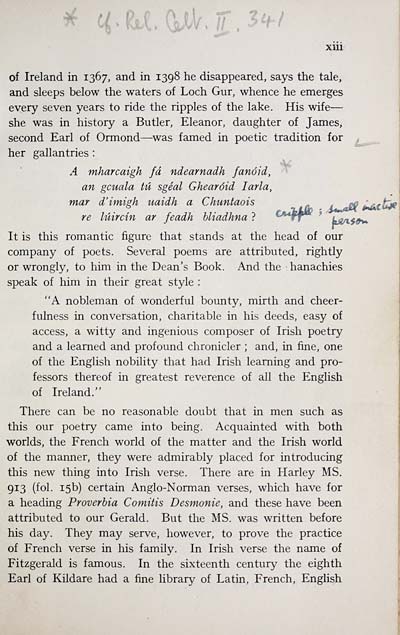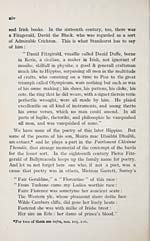Download files
Complete book:
Individual page:
Thumbnail gallery: Grid view | List view

ZttI
of Ireland in 1367, and in 1398 he disappeared, says the tale,
and sleeps below the waters of Loch Gur, whence he emerges
every seven years to ride the ripples of the lake. His wife —
she was in history a Butler, Eleanor, daughter of James,
second Earl of Ormond — was famed in poetic tradition for
her gallantries :
A mharcaigh fd ndearnadh fanóid,
an gcuala tú sgéal Ghearóid larla,
mar d'imigh uaidh a Chuntaois ^n ^,1;^
re lúircín ar feadh bliadhna ? C**|s^ » lt*xí*>»
It is this romantic figure that stands at the head of our
company of poets. Several poems are attributed, rightly
or wrongly, to him in the Dean's Book. And the hanachies
speak of him in their great style :
"A nobleman of wonderful bounty, mirth and cheer-
fulness in conversation, charitable in his deeds, easy of
access, a witty and ingenious composer of Irish poetry
and a learned and profound chronicler ; and, in fine, one
of the English nobility that had Irish learning and pro-
fessors thereof in greatest reverence of all the English
of Ireland."
There can be no reasonable doubt that in men such as
this our poetry came into being. Acquainted with both
worlds, the French world of the matter and the Irish world
of the manner, they were admirably placed for introducing
this new thing into Irish verse. There are in Harley MS.
913 (fol. 15b) certain Anglo-Norman verses, which have for
a heading Proverbia Comitis Desmonie, and these have been
attributed to our Gerald. But the MS. was written before
his day. They may serve, however, to prove the practice
of French verse in his family. In Irish verse the name of
Fitzgerald is famous. In the sixteenth century the eighth
Earl of Kildare had a fine library of Latin, French, English
of Ireland in 1367, and in 1398 he disappeared, says the tale,
and sleeps below the waters of Loch Gur, whence he emerges
every seven years to ride the ripples of the lake. His wife —
she was in history a Butler, Eleanor, daughter of James,
second Earl of Ormond — was famed in poetic tradition for
her gallantries :
A mharcaigh fd ndearnadh fanóid,
an gcuala tú sgéal Ghearóid larla,
mar d'imigh uaidh a Chuntaois ^n ^,1;^
re lúircín ar feadh bliadhna ? C**|s^ » lt*xí*>»
It is this romantic figure that stands at the head of our
company of poets. Several poems are attributed, rightly
or wrongly, to him in the Dean's Book. And the hanachies
speak of him in their great style :
"A nobleman of wonderful bounty, mirth and cheer-
fulness in conversation, charitable in his deeds, easy of
access, a witty and ingenious composer of Irish poetry
and a learned and profound chronicler ; and, in fine, one
of the English nobility that had Irish learning and pro-
fessors thereof in greatest reverence of all the English
of Ireland."
There can be no reasonable doubt that in men such as
this our poetry came into being. Acquainted with both
worlds, the French world of the matter and the Irish world
of the manner, they were admirably placed for introducing
this new thing into Irish verse. There are in Harley MS.
913 (fol. 15b) certain Anglo-Norman verses, which have for
a heading Proverbia Comitis Desmonie, and these have been
attributed to our Gerald. But the MS. was written before
his day. They may serve, however, to prove the practice
of French verse in his family. In Irish verse the name of
Fitzgerald is famous. In the sixteenth century the eighth
Earl of Kildare had a fine library of Latin, French, English
Set display mode to: Large image | Transcription
Images and transcriptions on this page, including medium image downloads, may be used under the Creative Commons Attribution 4.0 International Licence unless otherwise stated. ![]()
| Early Gaelic Book Collections > Matheson Collection > Dánta grádha > (19) |
|---|
| Permanent URL | https://digital.nls.uk/76585141 |
|---|
| Description | An anthology of Irish love poetry AD 1350-1750. |
|---|---|
| Shelfmark | Mat.62 |
| Additional NLS resources: | |
| Attribution and copyright: |
|
| Description | Items from a collection of 170 volumes relating to Gaelic matters. Mainly philological works in the Celtic and some non-Celtic languages. Some books extensively annotated by Angus Matheson, the first Professor of Celtic at Glasgow University. |
|---|
| Description | Selected items from five 'Special and Named Printed Collections'. Includes books in Gaelic and other Celtic languages, works about the Gaels, their languages, literature, culture and history. |
|---|

